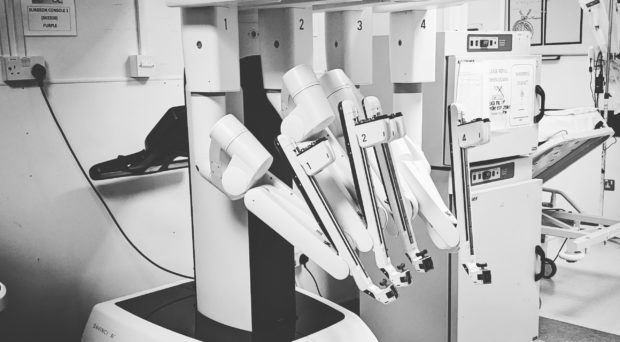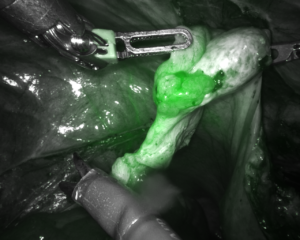
Background
Epithelial ovarian cancer (including fallopian tube cancer and primary peritoneal cancer) is the eighth most common cancer in women worldwide. Around 7300 women are diagnosed with ovarian cancer every year in the UK, making ovarian cancer the sixth most common cancer in women in the UK.
More than 70% of women with newly diagnosed ovarian cancer will present with advanced disease (FIGO stage-III or IV disease). One-year survival in England ranges from 98.0% (stage I) to 53.8% (stage IV), with 5-year survival rates of 93.3% and 13.4% for stages I and IV, respectively.
The MIRRORS study
The MIRRORS study (Minimally Invasive Robotic Surgery, Role in Optimal Debulking Ovarian Cancer, Recovery & Survival) was born out of a wish to improve the lives of women with advanced ovarian cancer and is the brainchild of Mr Butler-Manuel, who helped bring the first Da Vinci Robot to Guildford.
Guildford is now the UK’s first epicenter for training in robotic surgery, and a recognized center for minimal access surgical training and research in enhanced recovery. Guildford has the greatest experience in the UK in the use of robotics in gynecological oncology, having performed over 1500 gynecological oncology robotic procedures.

Over the last 10+ years we have seen how robotic surgery has benefited our patients who have a diagnosis of endometrial and cervix cancer. Average surgical blood loss has reduced from 300 ml to 50 ml and length of hospital stay from 6 days to 1 night.
Using the robotic platform we have increased the proportion of women with endometrial cancer who have had minimally invasive surgery from 33% to 93%. Conversion rates to open surgery have reduced from 18% to 1.7% in this time period. Length of stay in hospital for women with endometrial cancer has also reduced from a median of 6 days to 1 night.
Clearly, these diseases affect women in different ways. Women with advanced ovarian cancer often have much more extensive disease that can be complicated by adhesions, but underneath it all the surgery is the same. Both groups of women require a hysterectomy and removal of both tubes and ovaries. The main difference is the full removal of the omentum and peritoneal stripping required for resection of all visible disease.
This is a promising era for ovarian cancer.
Since opening MIRRORS we have found that the robotic platform is uniquely suited for women with very high BMI. The robotic platform facilitates extensive resection of disease including diaphragmatic stripping, which may have been technically difficult or access limited had the surgery been approached via the open route.
Criticisms of minimally invasive surgery are that although it provides excellent magnified vision and precision operating, the tactile element is lacking as you are not able to feel all peritoneal surfaces, and some argue this could lead to disease being missed.
Surgery for advanced ovarian cancer
Women with advanced ovarian cancer initially receive three cycles of chemotherapy followed by “interval debulking surgery”, sandwiched in the middle of their chemotherapy with three further cycles of chemotherapy completed after surgery.
The crux of MIRRORS is the hope that if we are able to improve how quickly women with advanced ovarian cancer recover from their interval debulking surgery they will be able to get back to chemotherapy quicker and overall their quality of life whilst on treatment will be improved. Perhaps reducing this time off chemotherapy will help in the long run.
The aim of surgery with advanced ovarian cancer is to remove all visible disease to get the tumor burden as low as possible. Ultimately, it is the chemotherapeutic agents that will keep the disease under control in what is increasingly being viewed as a chronic illness.

This is a promising era for ovarian cancer. There is an increasing understanding of the genomics of tumors and PARP inhibitors have recently been approved for both patients with BRCA mutations and those without.
As we get older we are more likely to develop cancer. With increasing age many women also become more frail. Not all of our patients with advanced ovarian cancer are able to contemplate or are fit enough to undergo extensive open surgery requiring post-operative high dependency support.
If we are able to provide the same surgery for a select group of women with advanced ovarian cancer and also provide them with the ability to recover and get back on to their chemotherapy quicker, we hope that this will provide positive benefits.
What’s next?
MIRRORS is currently a feasibility study assessing whether robotic surgery is an option that women like and would consider, while assessing the immediate intraoperative and postoperative outcomes. Once this initial feasibility trial is complete we aim to progress to MIRRORS RCT (Randomized Controlled Trial), to assess whether progression-free survival and overall survival is equivalent to standard open surgery.
Who is eligible for MIRRORS?
The MIRRORS study is open to adult women with advanced ovarian/fallopian tube cancer (Stage IIIc-IVb) who have had chemotherapy before surgery, have a pelvic mass ≤8 cm and don’t have another reason for requiring open surgery such as extensive disease requiring liver or upper gastro-intestinal surgical support. MIRRORS is a single-site feasibility study run at Royal Surrey County Hospital, Guildford. Once we launch MIRRORS RCT we hope to expand to more sites.
Comments